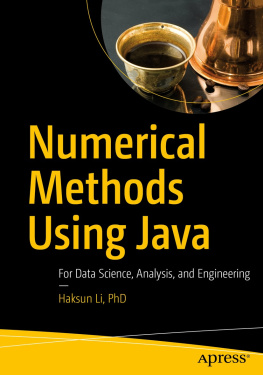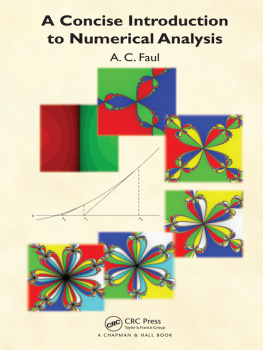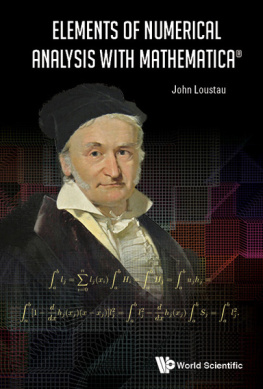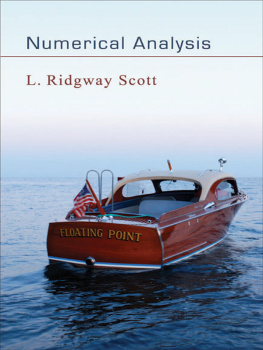Seiichi Nomura - C Programming and Numerical Analysis
Here you can read online Seiichi Nomura - C Programming and Numerical Analysis full text of the book (entire story) in english for free. Download pdf and epub, get meaning, cover and reviews about this ebook. year: 2018, publisher: Morgan & Claypool Publishers, genre: Computer. Description of the work, (preface) as well as reviews are available. Best literature library LitArk.com created for fans of good reading and offers a wide selection of genres:
Romance novel
Science fiction
Adventure
Detective
Science
History
Home and family
Prose
Art
Politics
Computer
Non-fiction
Religion
Business
Children
Humor
Choose a favorite category and find really read worthwhile books. Enjoy immersion in the world of imagination, feel the emotions of the characters or learn something new for yourself, make an fascinating discovery.

- Book:C Programming and Numerical Analysis
- Author:
- Publisher:Morgan & Claypool Publishers
- Genre:
- Year:2018
- Rating:5 / 5
- Favourites:Add to favourites
- Your mark:
- 100
- 1
- 2
- 3
- 4
- 5
C Programming and Numerical Analysis: summary, description and annotation
We offer to read an annotation, description, summary or preface (depends on what the author of the book "C Programming and Numerical Analysis" wrote himself). If you haven't found the necessary information about the book — write in the comments, we will try to find it.
C Programming and Numerical Analysis — read online for free the complete book (whole text) full work
Below is the text of the book, divided by pages. System saving the place of the last page read, allows you to conveniently read the book "C Programming and Numerical Analysis" online for free, without having to search again every time where you left off. Put a bookmark, and you can go to the page where you finished reading at any time.
Font size:
Interval:
Bookmark:
C Programming and Numerical AnalysisAn Introduction
To 2017 Microcontroller Education: Do it Yourself, Reinvent the Wheel, Code to Learn Dimosthenis E. Bolanakis 2017 Solving Practical Engineering Mechanics Problems: Statics Sayavur I. Bakhtiyarov 2017 Unmanned Aircraft Design: A Review of Fundamentals Mohammad Sadraey 2017 Introduction to Refrigeration and Air Conditioning Systems: Theory and Applications Allan Kirkpatrick 2017 Resistance Spot Welding: Fundamentals and Applications for the Automotive Industry Menachem Kimchi and David H. Phillips 2017 MEMS Barometers Toward Vertical Position Detecton: Background Theory, System Prototyping, and Measurement Analysis Dimosthenis E. Bolanakis 2017 Engineering Finite Element Analysis Ramana M. Pidaparti 2017 Copyright 2018 by Morgan & Claypool All rights reserved.
No part of this publication may be reproduced, stored in a retrieval system, or transmitted in any form or by any meanselectronic, mechanical, photocopy, recording, or any other except for brief quotations in printed reviews, without the prior permission of the publisher. C Programming and Numerical Analysis: An Introduction Seiichi Nomura www.morganclaypool.com
| ISBN: 9781681733111 | paperback |
| ISBN: 9781681733128 | ebook |
| ISBN: 9781681733135 | hardcover |

It is suitable as a textbook for sophomore-level STEM students. The book has two goals as the title indicates: The first goal is to introduce the concept of computer programming using the C language. The second goal is to apply the programming skill to numerical analysis for problems arising in scientific and engineering fields. No prior knowledge of programming is assumed but it is desirable that the readers have a background in sophomore-level calculus and linear algebra. C was selected as the computer language of choice in this book. There have been continuous debates as to what programming language should be taught in college.
Until around the 1990s, FORTRAN had been the dominating programing language for scientific and engineering computation which was gradually taken over by modern programming languages as PASCAL and C. Today, MATLAB is taught in many universities as a first computer application/language for STEM students. Python is also gaining popularity as a general purpose programming language suitable as the first computer language to be taught. Despite many options for the availability of various modern computer languages today, adopting C for scientific and engineering computation still has several merits. C contains almost all the concepts and syntax used in the modern computer languages less the paradigm of object-oriented programming (use C++ and Java for that). It has been observed that whoever learns C first can easily acquire other programming languages and applications such as MATLAB quickly.
The converse, however, does not hold. C is a compiled language and preferred over interpreted languages for programs that require fast execution. There is no shortage of good textbooks for the C language and good textbooks for numerical analysis on the market but a proper combination of both seems to be hard to find. This book is not a complete reference for C and numerical analysis. Instead, the book tries to minimize the formality and limits the scope of C to these essential features that are absolutely necessary for numerical analysis. Some features in C that are not relevant to numerical analysis are not covered in this book.
C++ is not covered either as the addition of object-oriented programming components offers little benefit for numerical analysis. After finishing this book, the reader should be able to work on many problems in engineering and science by writing their own C programs. The book consists of two parts. In Part , the general syntax of the C language is introduced and explained in details. gcc is used as the compiler which is freely available on almost all platforms. include solving a single equation, numerical differentiation, numerical integration, solving a set of simultaneous equations, and solving differential equations. include solving a single equation, numerical differentiation, numerical integration, solving a set of simultaneous equations, and solving differential equations.
In Appendix , gnuplot which is a visualization application is introduced. The C language itself has no graphical capabilities and requires an external program to visualize the output from the program. In Appendix , a brief tutorial of Octave/MATLAB is given. This is meant for those who are familiar with C but need to learn Octave/MATLAB in the shortest possible amount of time. In Appendix , a brief tutorial of FORTRAN is given. Again, this is meant for those who are already familiar with C to be able to read programs written in FORTRAN (FORTRAN 77) quickly.
This book is based on the course notes used for sophomore-level students of the Mechanical and Aerospace Engineering major at The University of Texas at Arlington. Seiichi Nomura March 2018
Seiichi Nomura March 2018
Font size:
Interval:
Bookmark:
Similar books «C Programming and Numerical Analysis»
Look at similar books to C Programming and Numerical Analysis. We have selected literature similar in name and meaning in the hope of providing readers with more options to find new, interesting, not yet read works.
Discussion, reviews of the book C Programming and Numerical Analysis and just readers' own opinions. Leave your comments, write what you think about the work, its meaning or the main characters. Specify what exactly you liked and what you didn't like, and why you think so.








